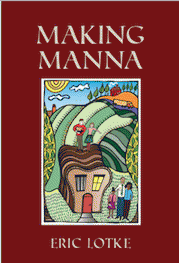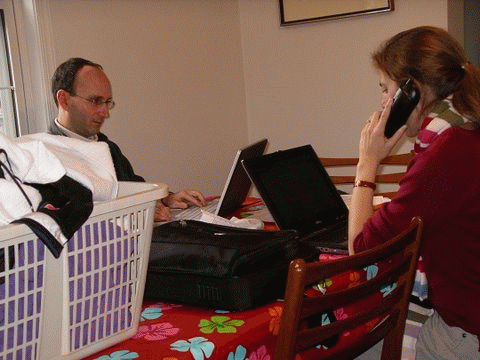Talking with author, Eric Lotke
My guest today is author, attorney and progressive activist, Eric Lotke. Welcome back to OpEdNews, Eric. We last spoke almost almost six years ago, when your first novel, 2044: The Problem Isn't Big Brother. It's Big Brother, Inc., came out. It was modeled on Nineteen Eighty-Four, the iconic dystopian novel by George Orwell. Pretty ambitious for a first-timer. Now, you've got a new book out, Making Manna. Congratulations! What's it about?
It's about a young woman who is a victim of terrifying abuse. In chapter one, she flees her home with her newborn baby. Now, she has to build a new life for herself and her son.
We readers know her background and would give her help and a hug. But the world sees a single teenage mother. It does not treat her kindly.
Making Manna shows her finding her way. First, she needs to find a job and stay afloat. Second, she needs to heal her wounds and make peace with her past.
And that baby? In the beginning, he's merely cute. By the end of the book, he's a teenager who wants to learn the truth of his parentage. One reader called it a "coming of age" story of both the mother and her son at the same time. I think it's about love, betrayal and forgiveness. It's also about our dead-end economy, helping systems that fail to help, and a justice system that causes more problems than it solves.
Making Manna touches on so many of society's trigger points - sexual assault, teenaged single moms, drug dealers - it could easily have devolved into a soap opera but it most certainly did not. Just how did you pull that off?
Really it's a simple story. It's about a mother and son, and whether they're going to be okay.
The complications come from the real world. Her boss pays her less than the minimum wage because he knows he can get away with it. Her best friend is arrested for no good reason -- and she's African American. But those aren't soap opera contrivances. That's Ferguson, Missouri and low-income America.
The most explosive scene involving the police comes straight from my own experience as defense counsel. Interestingly, white readers sometimes find that scene unbelievable and question its authenticity. Minority readers find it uncomfortably familiar.
I think you're referring to the way the police break the door down and ransack the apartment, finding nothing, and then leave, completely unapologetic. Subsequently, Libby's best friend and her husband are set up and convicted of selling drugs. They each get 60 years. I realize this is fiction but isn't that a little over the top, Eric? Even murderers rarely get such stiff sentences.
Two points. First, the officer is not just unapologetic. His final words are, "The police report will say we were given consent to enter." The entry couldn't have been less consensual, but the officer knows he'll get away with it.
Regarding 60 years: Yes it's long, but I took it straight out of the Virginia Sentencing Guidelines. I also had someone specific in mind, a young woman (in her thirties) whom I met after she'd been released. I knew she'd been harshly sentenced, and some miraculous lawyering had gotten her out. But still I was flabbergasted when I learned her original sentence was 80 years. I want readers to feel a little like I did at times like that.
The process is subtler but at least as important. In theory, we have procedural safeguards like search warrants, right to counsel, and proof beyond a reasonable doubt. This fact-based story shows how little of that matters.
So, here's the artistry part. How did you take the elements you just described, mix them together and morph the story to actually be very positive? And how realistic or possible is the outcome you paint?
The problems of the justice system go far beyond technical details like access to counsel and excessive sentences. The real problem is that the justice system doesn't protect people who need protection and doesn't help people who've been hurt. My story shows people -- betrayed by the justice system -- finding their own paths. They want to heal wounds, hold people accountable and make amends. But they must do it on their own. Their instincts are closer to what's sometimes called Restorative Justice. "Crime is a wound. Justice should heal." That's a story that's naturally infused with hope.
The beauty is in the characters. These are good people trying to do the right thing. They don't complain about the long prison term; they look after each other's children. They don't complain about the bad boss; they gather co-workers and demand a raise.
You and I are discussing policy implications. They aren't. They're busy with their daily lives. They need to cook dinner, get to work on time, and help a friend who needs a favor.
Okay, maybe the real world isn't quite that sunny. But I want readers to have a good time. It's a story, after all, not a policy brief. Maybe we real people in the non-fiction world will get an idea or two"
Agreed. Here's exactly what you've accomplished, Eric: You've breathed three-dimensional life into these characters as they figure out how to navigate with dignity through the many daunting challenges they face. You've put a face on what are too often simply "policy problems", making it much harder for us to dismiss or turn away. And that's what makes the story so moving: these people are so real. Kudos. I was sad for the book to end, didn't want to say goodbye and I keep thinking Making Manna would make a heck of a movie. Your thoughts?
Thanks! A movie would be fun. I'm even a semifinalist in the Book Pipeline competition that considers stories for movie scripts.
Aha!
It occurs to me that I should explain why it's called Making Manna.
Okay.
First, because their manna doesn't come from heaven. They need to make their own. The book shows how the world is stacked against people like this -- but also provides hope that good people can do the right thing, and still come out ahead.
Finally, of course, they spend a lot of time baking bread. Half the book is spent in the kitchen.
There are some wonderful kitchen scenes. Where did the baking 'thing' come from? Are you a baker?
I earned my living as a cook during my early years. Indeed, when I started my career as a public interest lawyer -- not an easy path -- I did it knowing that I had an alternative skill in my back pocket. If lawyering didn't quite pay the bills I could pick up shifts as a chef. It's a portable skill, and pays pretty well.
In the book, cooking is important for the ultimate baking business, but first as a path to self-sufficiency. When Sheila learns that boiling pasta is cheaper than the McDonalds dollar menu, it's kind of a turning point. She even feels better and loses a few pounds.
Prisons sometimes brag about correctional education (don't believe them). Really they should teach people how to cook. Cancel the Aramark contract for food service. Buy ingredients and put people to work (and don't forget to ask why they're locked up at all).
Interesting idea about prisons teaching inmates to cook. Why don't we throw in gardening, too, while we're at it? Sadly, I don't think prisons care that much, despite any lip service, about humanizing their populations or teaching them life skills or any other skills, for that matter.
One of my characters in prison tends a little garden she made from flowering weeds.
True. I'm not surprised to learn that you were a chef. Those baking scenes positively hum with life. What didn't we talk about yet that you'd like to before we wrap this up?
Heavens! There's so much more. From prisoner reentry to childhood crushes. It's a tight little book filled with life. Parts are hard -- because it's life after all -- but it's also loving and fun. And maybe someday someone might open a bakery like that.
Thanks so much for talking with me, Eric. As you might have gathered, I really enjoyed Making Manna. Send me a ticket to the opening of the movie!
***
Eric's website : Breaking News, February 2015.Making Manna is named
Semi-Finalist in Book Pipeline competition to turn novels into films.
Identified as a "unique, compelling" story.
Also from the website: His 2002 research on how the U.S. Census Bureau counts people in prison has led to legal changes in four states so far.
my previous interview with Eric:
Talking with Eric Lotke, Author of "2044:The Problem isn't Big Brother. It's Big Brother, Inc. "8.30.2009
Part Two of that interview
my pieces on restorative justice:
Bob Koehler on Justice with Healing at Its Core 6.23.2014
Peer Juries Rule! A Look Inside Restorative Justice 8.20.2014
my writings on incarceration:
Maya Schenwar: "Locked Down, Locked Out: Why Prison Doesn't Work and How We Can Do Better" 1.25.2015
Judy White series - her husband is serving time in federal prison
BOP: 'Til Death Do Us Part?- latest, installment #32, of ongoing series 8.1.2014
Clete Wetli: An Alabama Liberal on Mass Incarceration's Steep Price Tag 6.26.14
Maverick Singer Songwriter Ellen Bukstel Takes On Private Prisons and Big Pharma8.5.2014
Part Three: Victoria Law Explores "Resistance Behind Bars: The Struggles of Incarcerated Women" 2.19.2010 - Third of three-part series








